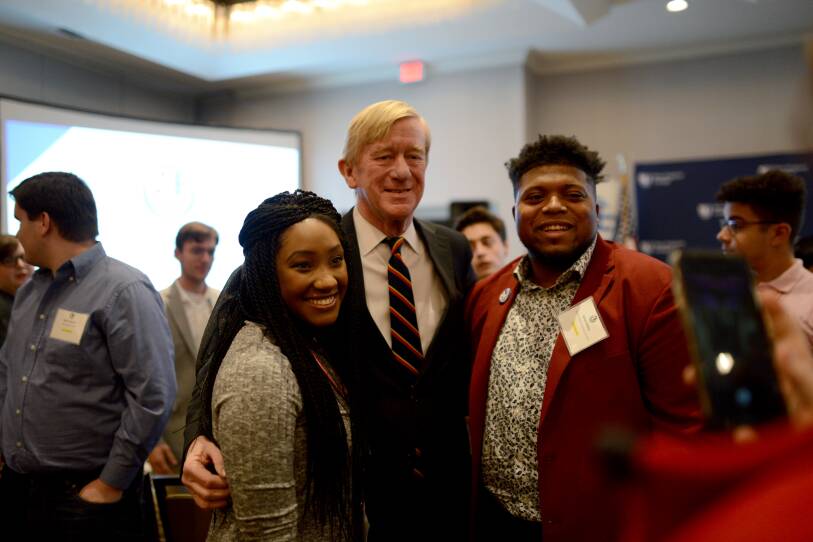Two decades after leaving the governor’s office in Massachusetts, Bill Weld is trying to knock a sitting president out of a party primary — a feat political historians say hasn’t been accomplished in the modern era.
“To describe Bill Weld’s challenge as an uphill battle is being rather generous,” said Dante Scala, a political science professor at the University of New Hampshire. “It’s more like trying to climb the face of a cliff at a 90-degree angle with his bare hands.”
Weld, 74, says he is taking on that challenge in order to give disaffected Republicans a choice in this November's election other than President Donald Trump.
“I think it’s very important to offer an alternative to the president’s governing style. I don’t approve of it at all. I think he’s tilting in the direction of autocratic institutions as opposed to democratic institutions,” Weld said when asked if his aspirations are out of touch with what GOP voters want. “To be in favor of our Constitution and our democratic institutions is never out of touch.”
But Weld’s insurgent campaign does not seem to be resonating with many voters in New Hampshire, which holds the nation’s first primary on Feb. 11. A statewide survey of likely voters in the GOP primary conducted last month by MassINC Polling Group for WBUR showed Trump leading over Weld by 65 percentage points.
Read more: Deval Patrick's New Hampshire Pitch: Politics Is A Two-Way Street
On top of his struggle to connect with voters, Weld is severely out-funded. Between January and September 2019, he raised approximately $1.3 million — a fraction of Trump’s $97 million in the same period.
On a chilly weekday morning in Manchester, N.H., this month, Weld campaigned at a lofty law office before an audience of about two dozen, then at a convention town hall where 150 college students were present.
While multiple people applauded his boldness and principles at both events, committed supporters were difficult to find.
Several college students attending the convention who had kind words about Weld, for example, fell into silence, and then let out a burst of laughter when asked if they’d consider voting for him.
One of them was Concord, N.H., native Tyler Baker, who will vote in his first presidential primary this year and said he was impressed with Weld.
"He’s going up against the current president. I thought that it was really cool how he said, 'There are things I agree with the president [on], but here’s how I would change it,'" Baker, 18, explained.

Fellow student Matt McFall of Henniker, N.H., identified himself as a swayable Democrat, willing to change alliances for the right candidate. He called Weld’s message refreshing.
“He was talking about his history of bipartisanship, and it did seem genuine that he wanted to reach across party lines,” McFall said.
Jim Townsend, 73, a Hanover, N.H. resident, came to hear Weld at the law office.
“I appreciated a lot of his analysis,” he said. “My whole family was always Republican. We’ve changed none of our views. The party has just abandoned us, so we’ve all become Democrats.”
Townsend seemed resigned to another Trump win and said he wasn’t sure who he’d vote for.
Weld has taken his pitch to voters in the early contest states, combining the classic tenets of the Republican Party — fiscal prudence and small government — with Libertarian principles supporting abortion rights and LGBT rights. Weld also emphasizes a “Never Trump” streak, assailing the president’s grasp of constitutional law, criticizing his handling of foreign policy and wagging a proverbial finger at the revolving door of cabinet officers.
Weld has said, however, he would leave in place Trump’s tax cuts and the Space Force if elected.
The traditional principles he touts are part of what Claira Monier, a Weld campaign co-chair, said kept her from leaving the GOP this election. She had been considering Democratic candidates before deciding to join Weld’s team.
“I think we’re losing some of the principles of the Republican party,” said Monier, 79. In her view, supporting Weld means sticking to her guns — a direct contrast to the concern about electability that she sees plaguing Democrats.
“There are people who only want to support winners,” she said. “I say, ‘You want me to support someone only because they’ll win?’ Winning, to me, is not as important as the future of this country. … I do want to vote my principles as best I can.”
Scala, the UNH professor, said Weld lacks “a weak incumbent” to target in his insurgent campaign against Trump.
“[Trump is] quite popular among white evangelicals, he’s cut taxes, he’s nominated conservative judges, he’s held fast on second amendment rights,” Scala said. “So it's difficult to identify anyone, with the exception, perhaps, of moderate Republicans, any faction that is discontented with President Trump.”
Weld, asked how he’s feeling about the campaign given that many see it as a long-shot, responded with a smile and an upbeat tone.
“Oh, it’s a long shot,” he conceded. “What I’ve got to do is exceed expectations in New Hampshire, then go on to Super Tuesday that has friendly ground — Massachusetts, Vermont, Colorado, California and a bunch of other very interesting states — and we’ll take it from there.”
Weld then pointed to former Ohio Gov. John Kasich’s bid in the 2016 election cycle.
“Last time around, people viewed [him] as the runner-up,” Weld said, noting that Kasich did win the primary vote in his home state of Ohio. “I think we’re going to be able to do a good bit more than that, even in the early going.”





